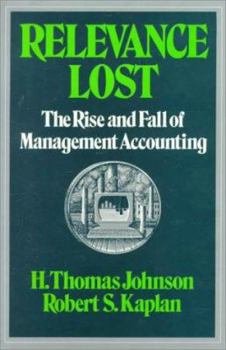Relevance Lost: The Rise and Fall of Management Accounting
Select Format
Select Condition 
Book Overview
Traces the history of the role of management accounting in business and argues that present management accounting systems have become obsolescent.
Format:Hardcover
Language:English
ISBN:0875841384
ISBN13:9780875841380
Release Date:January 1987
Publisher:Harvard Business Review Press
Length:269 Pages
Weight:1.44 lbs.
Dimensions:1.1" x 6.4" x 9.5"
Customer Reviews
5 ratings
this is a book that revolutionized management accounting
Published by Thriftbooks.com User , 21 years ago
Relevance lost of a book about the history of management accounting. The book is very well documented in that in times they were able to deduce different conclusions made by others. They start from the very beginning exploring as far back as the 18th century. They start out by discussing how textile mills started recording in their books accounting information. They begin from the very beginnings of accounting. Accounting emerged as a discipline in the early 18th century, but their underlying purpose in not for internal uses but it was created so that stakeholders can gauge the value of their investment in the firms that put out these financial statements. In the book there are a number of firms they highlight that made important contributions to management accounting. The first company they highlight is DuPont corporation in the nineteenth century. There is a theme to the development of management accounting. DuPont first staterted out as a manufacturer of gunpowder but went on to become bigger. The first companies that innovated their way of internal controls in management accounting grew out of a necessity. DuPont first came out with a measure of their business which was the return on investment measure. Because Dupont was becoming bigger and it needed to measure return on investment to measure the profitability of individual business units. It was a measuring rod to asses the different business activities of it business units. With this measure the managers of DuPont could make decisions such us which business units to invest on and do away with units that are performing poorly. In the 1920's at General Motors they have been experimenting with using variances to measure how well they are doing in their manufacturing. In to the picture is a man named Alfred Sloan, he is one of the most brilliant thinkers in management. With implementing variances GM was able to have a uniform way to impose standards to its managers. With this system, GM's growth became remunerative. Then there came a period as the authors put it when relevance was lost. Financial accounting accounted for the bulk of the innovations in accounting leaving behind management accounting. This is like the "dark ages" of cost accounting when companies and academics did not innovate methods and processes to advance management accounting. There were a number of reasons for this, first is the requirement imposed in companies to generate financial statements for the stakeholders of the companies. Second, the cost of putting together the necessary information was prohibitive. Technology has not yet grown mature enough to allow managers to go through the trouble of compiling the information needed to make the decisions. The beauty of this book is that it traces beginnings of topics that are familiar to us now. Topics like variances, discounted cash flow analysis, return on investment, sunk cost, and even just-in-time inventory systems. The next evolution of managem
Historical backgrounds of BSC, ABC & EVA
Published by Thriftbooks.com User , 23 years ago
If you want to understand everything about the historical backgrounds of such now well-known management instruments like the balanced scorecard, activity based costing and EVA, there is no better book to read than this book. This book started off a transformation of management accounting and of organizational performance management. Essential reading for controllers, students of management and management consultants.
Broad History of Mgmt Accounting
Published by Thriftbooks.com User , 23 years ago
Good in-depth survey of the history and purpose of Management Accounting. Classic book. You see Kaplan's thought processes as he develops the basis of his later works on new forms of accounting such as the Balanced Scorecard and EVA.If you are a management accountant this book will put your work into perspective as well as caution you about the pitfalls of doing things the way theu have always been done.
A good read for discouraged management accountants.
Published by Thriftbooks.com User , 26 years ago
For those management accountants who feel less than totally appreciated (the real ones will know this to be a common feeling) then this book shows how financial accounting usurped management accounting when the bean counters went looking for shareholders and needed to tell less than the truth about what was going on inside their firms.If auditors are just hookers with a degree, then financial accountants are then just politicians without a cause - you cannot run a business on late and averaged data from the financial perspective.This book reminds us that knowing what things cost to make and cost to sell is what keeps a firm on the black ink side of the ledger.Worth a read.
Excellent treatment of subject
Published by Thriftbooks.com User , 27 years ago
This is a small book which puts forward the idea that we must return to a better use of product cost data to make decisions. The authors review the literature going back to the first industries in the 1700's that used cost data in a managerial way. The work quotes heavily A. Chandler, J.M. Clark and Vatter for their contributions. It then reformulates their idea's and other historical data to come to the author's conclusion. In summary, it is well done for those interested in the subject and have an appreciation for business history






